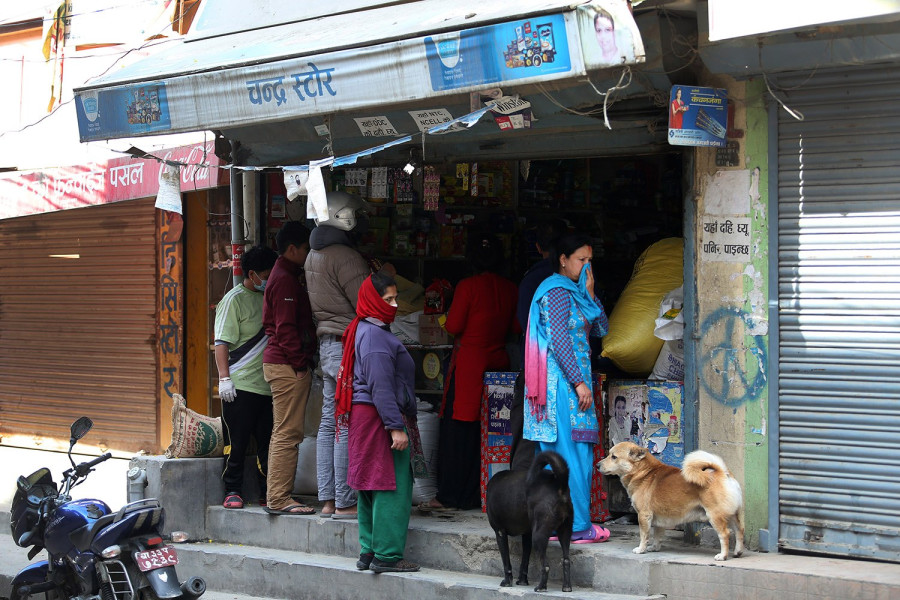National
Daily wage workers are more worried about starving to death than Covid-19
Most worker households are likely to have enough supplies and savings for a week but if the lockdown is to continue, they will need government’s help, activists say.
Anup Ojha
Laxmi Chhetri and her husband have both not been to work for the past two days. Chhetri, who lives with her husband and two children at the squatter settlement in Sankhamul, works as a maid while her husband is a house painter. With the country under lockdown, neither of them has been able to go to work, and as daily wage labourers with few savings, things are not looking good.
“We have been sustaining our family with our daily wages,” said 38-year-old Chhetri. “If the lockdown continues, we will die of starvation.”
A nationwide lockdown to prevent the spread of Covid-19 might be underway but Chhetri does not feel safe in the cramped space that she shares with 110 other households. Numerous households share the same tap and the same toilet, which only increases the chances of the disease spreading. And families like Chhetri do not have access to hand sanitizer either; they make do with soap and water.
“The main problem is now going to be a shortage of water,” said Chhetri. “We used to get free water twice a week through a tanker but we don’t know whether it will come.”
For daily wage workers and labourers, the lockdown means that they are now deprived of their only source of income. Most squatter households like Chhetri’s are financially insecure, meaning they have few to no savings and are often the ones who suffer the most during crises like the ongoing Covid-19 pandemic.
Kalpana Nepali, a domestic worker who also lives in a squatter settlement in Sinamangal, told the Post over the phone that more than the coronavirus, they are worried about survival.
“After the government announced the lockdown on Sunday, I bought 20kg of rice paying Rs 1,000 and we only have one gas cylinder that is about to empty,” said 40-year-old Nepali.
Ram Nepali, her husband, said that it was difficult to abide by the government’s order to remain indoors as the inside of their tin-roof shack tends to get extremely hot during the day.
In Sinamangal ‘s Ward-9 and Ward-31, there are around 700 squatter households, all of them supported by daily wage earners.
“Rich people have managed to store food and can now spend some time at home with their families. It’s like a vacation for them,” said 43-year-old Ram. “But for working class people like us, if this situation prolongs, we will die of hunger.”
On Wednesday, Prime Minister KP Sharma Oli sent out a message on social media, urging everyone to work from home, as he too was “running the government from home” but families like the Chettris and the Nepalis don’t have that option.
According to the Nepal Landless Democratic Union Party, there are around 29,000 squatter families in Kathmandu.
Bhagwati Adhikari, executive director at the Mahela Ekata Samaj, which works to secure the rights of squatter women, said that the most squatter families will face difficulties.
“Many of these people work in the informal sector and the women mostly work in the nearby apartments as maids,” said Adhikari. “Most of them can only sustain a week of not working. If the lockdown is to continue, the state will need to look after them.
Government entities, however, have not even discussed the problem. According to
Navaraj Dhakal, joint secretary at the Ministry of Supplies, the ministry had not discussed the problems of daily wage workers.
“At present, we are more concerned with how to open more shops and get goods from India,” said Dhakal. “If the Home Ministry makes a decision to distribute goods then we will do so, but till date, we have not had any discussion regarding this issue."
Kathmandu Metropolitan City officials too said that they didn’t yet have a concrete plan.
“I will raise this issue with mayor Bidya Sundar Shakya in our meeting on Thursday,” said Deputy Mayor Hari Prabha Khadgi. “I know these people are suffering and they are in need of help.”




 9.12°C Kathmandu
9.12°C Kathmandu.jpg)















